Contest Alert from Writer Beware
Victoria Strauss on Writer Beware gives input on the TheNextBigAuthor.com contest: “When entering a competition, you should always know exactly with whom you’re dealing.” Seems to go without saying, and yet…
At the NewPages Blog readers and writers can catch up with their favorite literary and alternative magazines, independent and university presses, creative writing programs, and writing and literary events. Find new books, new issue announcements, contest winners, and so much more!
Victoria Strauss on Writer Beware gives input on the TheNextBigAuthor.com contest: “When entering a competition, you should always know exactly with whom you’re dealing.” Seems to go without saying, and yet…
 Crow Arts Manor is a 500-square-foot space in Northeast Portland, Oregon that will be home to classes (writing, fine and graphic arts), music, readings, and gallery space.
Crow Arts Manor is a 500-square-foot space in Northeast Portland, Oregon that will be home to classes (writing, fine and graphic arts), music, readings, and gallery space.
Crow Arts Manor means to offer affordable, six-week classes from a roster of instructors known as some of Portland’s most talented writers and artists. Currently scheduled is Emily Kendal Frey: Poetry Workshop; Jesse Reklaw: Elements of Cartooning; Zachary Schomburg: The Narrative Prose Poem.
Crow Arts Manor has access to the original Baptist chapel in the building and will be hosting a number of musical performances and literary readings. The gallery will host 8-10 visual artists, with work rotating every three months. They are also in the process of building one of the largest libraries of independently produced books and journals in the country with the goal to have the space open six hours a day, inviting the public to come and read.
The grand opening is April 8-10.
[Logo image by Jennifer Parks.]
 With an endearingly low-budget production style, Jupiter 88 is an enjoyable way to take in contemporary poetry read by the poets. Hosted and published by poet CA Conrad, episodes thus far include video-poem readings by Joanna Fuhrman, Stacy Szymaszek, Laura Spagnoli, Ryan Eckes, Paul Legault, Janet Mason, Joshua Beckman, Robert Dewhurst, Michelle Taransky, Anne-Adele Wight, Eileen Myles & Leopoldine Core, Erica Kaufman, Filip Marinovich, Rod Smith, Mel Nichols, Ryan Walker, Frank Sherlock, and Debrah Morkun.
With an endearingly low-budget production style, Jupiter 88 is an enjoyable way to take in contemporary poetry read by the poets. Hosted and published by poet CA Conrad, episodes thus far include video-poem readings by Joanna Fuhrman, Stacy Szymaszek, Laura Spagnoli, Ryan Eckes, Paul Legault, Janet Mason, Joshua Beckman, Robert Dewhurst, Michelle Taransky, Anne-Adele Wight, Eileen Myles & Leopoldine Core, Erica Kaufman, Filip Marinovich, Rod Smith, Mel Nichols, Ryan Walker, Frank Sherlock, and Debrah Morkun.
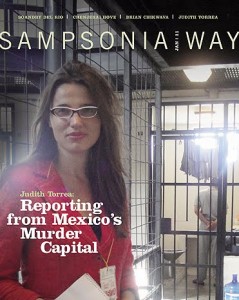 Sampsonia Way is an online magazine sponsored by City of Asylum/Pittsburgh celebrating literary free expression and supporting persecuted poets and novelists worldwide.
Sampsonia Way is an online magazine sponsored by City of Asylum/Pittsburgh celebrating literary free expression and supporting persecuted poets and novelists worldwide.
Previous issues of the magazine have focused on Burma, China, Cuba, Haiti, and Iran. The current issue of the magazine includes:
“Soandry del Rio: Can’t Stop. Won’t Stop.” by Joshua Barnes
“You Must Face the Consequences: The Price of Committing Journalism in Zimbabwe” by Elizabeth Hoover
“Under the Shadow of Drug Trafficking” by Silvia Duarte
“Aaron Jenkins: Getting Stuff Off His Chest” by Jen Lue
“Women Who Don’t Bite their Tongues: Writing Workshop Celebrates More Than Thirty Year” by Elizabeth Hoover
Connie Everett has taken over the editorial role for Pudding Magazine, one of the longest-running print journals in the U.S. Printed by Pudding House Press, Pudding Magazine continues its quarterly tradition with a look to updating guidelines, subscriptions, and submissions online. Welcome aboard Connie – great to see PM continue onward and e-ward!
 Flying House is an annual collaboration project that kicks off in May with the announcement of five artist-writer pairs. Once the pairs are picked, they have a good month to swap ideas back and forth. After six months, with deadlines and check-ins along the way, Flying House culminates in a visual and written representation of the collaborations in a gallery space with a reading and celebration.
Flying House is an annual collaboration project that kicks off in May with the announcement of five artist-writer pairs. Once the pairs are picked, they have a good month to swap ideas back and forth. After six months, with deadlines and check-ins along the way, Flying House culminates in a visual and written representation of the collaborations in a gallery space with a reading and celebration.
On Saturday, December 11, five writers met their five artist partners at the Maes Studio in downtown Chicago, IL, for a night of artistic revelry. The participants were:
Megan Fink and Chris Annen
AB Gorham and Michael Maes/Jillian McDaniel
BJ Hollars and Jenae Neeson
Daniel Letz and J Paonessa
Danilo Thomas and Jason Watts
Applications for the 2011 Flying House are open until April 25. Artists and writers need not apply together, in fact, Flying House discourages that.
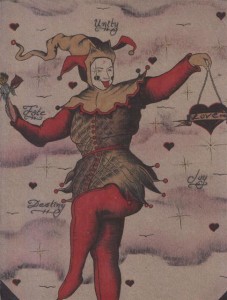 Sarah Khan is the editor of BRICKrhetoric, an online literary & visual arts journal based in Chicago. “BRICKrhetoric was established in 2009 to provide a canvas for emerging and established artists alike to share their work, illuminating topics in the humanities for the discovery and enjoyment of its readers. BRICKrhetoric features original poetry, prose, artwork and photography with a multicultural and urban focus.”
Sarah Khan is the editor of BRICKrhetoric, an online literary & visual arts journal based in Chicago. “BRICKrhetoric was established in 2009 to provide a canvas for emerging and established artists alike to share their work, illuminating topics in the humanities for the discovery and enjoyment of its readers. BRICKrhetoric features original poetry, prose, artwork and photography with a multicultural and urban focus.”
BRICKrhetoric was founded in November 2009, on the campus of East-West University in Chicago, IL, and initially invited submissions from students, faculty, staff & friends of the university for the first three issues. In December 2010, BRICKrhetoric became independently-run by a small group of volunteers, and shifted its focus to include students from across Chicagoland (and beyond) with a mission to support literacy, promote cross-cultural perspective, celebrate the literary/visual arts, and provide a canvas for writers/artists (of any age) to share their work.
[Pictured: “Love Joy Faith Destiny Unity” by Alfred Phillips from the June 2010 issue]
 The Dos Passos Review Spring 2011 (7.2) offers a special preview of the works by Briery Creek Press Liam Rector First Book Prize for Poetry 2011 winner Bonnie Bolling. Over a dozen poems from her collection In the Kingdom of the Sons are offered in this journal issue.
The Dos Passos Review Spring 2011 (7.2) offers a special preview of the works by Briery Creek Press Liam Rector First Book Prize for Poetry 2011 winner Bonnie Bolling. Over a dozen poems from her collection In the Kingdom of the Sons are offered in this journal issue.
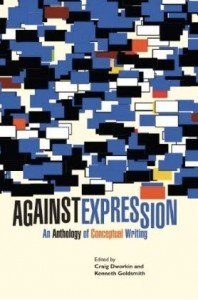 The introductory essays and Table of Contents to Against Expression: An Anthology of Conceptual Writing (2011, Northwestern U Press) are available for download. The first essays by the editors are “Why Conceptual Writing? Why Now?” by Kenneth Goldsmith and “The Fate of Echo” by Craig Dworkin.
The introductory essays and Table of Contents to Against Expression: An Anthology of Conceptual Writing (2011, Northwestern U Press) are available for download. The first essays by the editors are “Why Conceptual Writing? Why Now?” by Kenneth Goldsmith and “The Fate of Echo” by Craig Dworkin.
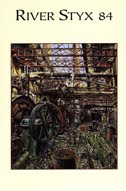 Issue 84 of River Styx includes poems by the winners of the 2010 River Styx International Poetry Contest:
Issue 84 of River Styx includes poems by the winners of the 2010 River Styx International Poetry Contest:
1st Place Stephen Gibson, “Megapixels”
2nd Place Diana Arterian, “The Albatross, Golden Mollymawk”
3rd Place Will Greenway, “Annunciation”
Honorable Mention Susan Cohen, “Pantoum of The Blue Virgin”
The 2011 contest is currently open until May 31, 2011; Judge B. H. Fairchild.. Entrance fee includes a one-year subscription to the magazine, all entrants are considered for publication, and the winners are published with the first place winner receiving $1500.
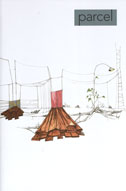 Edited by Kate Lorenz with Designer Justin Runge, Parcel is a biannual print publication, sent to subscribers with limited edition broadsides and postcards. Publisher Heidi Raak is also owner of The Raven Book Store, in Lawrence, KS.
Edited by Kate Lorenz with Designer Justin Runge, Parcel is a biannual print publication, sent to subscribers with limited edition broadsides and postcards. Publisher Heidi Raak is also owner of The Raven Book Store, in Lawrence, KS.
The first issue of Parcel (Spring 2011) includes works by Kate Bernheimer, Brooklyn Copeland, Daniel Coudriet, Nick Courtright, Jenny Gropp Hess, Daniel A. Hoyt, Friedrich Kerksieck, Jeffry Koterba, Kristy Logan, Peter Longofono, BJ Love, Anthony Luebbert, Michael Martone, Susan McCarty, Jaclyn Mednicov, Matt Moore, Matthew Nienow, Brian Oliu, Pamela Ryder, Christopher Salerno, and J.A. Tyler.
Parcel is available for subscription ($20/yr) and is open for online submissions using Submishmash.
For the 5th year in a row Alimentum celebrates National Poetry Month with menupoems – broadsides placed in area restaurants for the month of April.
From Esther Cohen, Alimentum‘s menupoems editor:
We’ve been wondering
What menu of words
What words would make you
Really happy to see
On your menu
Words to replace
The ordinary army
Appetizer
Entr
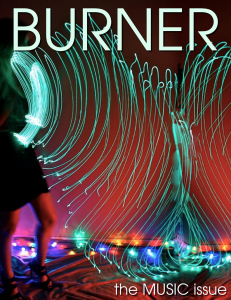 The newest issue of Burner Magazine online is The Music Issue, with editorials and features of Yoko Ono, Saul Williams, Broken Social Scene, Chromeo, Pendulum, Russ Chimes, Peaches, Seefeel, Humans, Bikini, and Canadian media personalities, Jian Ghomeshi and Kate Carraway. All selected poetry, prose, photography and visual art revolve around the theme of music.
The newest issue of Burner Magazine online is The Music Issue, with editorials and features of Yoko Ono, Saul Williams, Broken Social Scene, Chromeo, Pendulum, Russ Chimes, Peaches, Seefeel, Humans, Bikini, and Canadian media personalities, Jian Ghomeshi and Kate Carraway. All selected poetry, prose, photography and visual art revolve around the theme of music.
2011 marks 13 years in print for The First Line. To celebrate, they are offering the Spring 2011 issue as a free download until March 13. Happy 13 TFL – and thank you!
The following have been added to The NewPages Big List of Literary Magazines:
ottawater – poetry
New Mirage Journal – poetry, reviews
Cats with Thumbs – poetry, fiction
Muse India – poetry, literary criticism, essays, interviews, reviews short fiction
Bat Shat Magazine – prose, poems, and flash fiction
Lingerpost – poetry
The Caterpillar Chronicles – poetry, fiction, creative nonfiction, mixed genre, video, art, photography, mixed media
SPLIT – poetry, fiction, art, photography
Dear Navigator – fiction, essay, poetry, audio, video, hybrid, collaboration
Pakistaniaat: A Journal of Pakistan Studies – scholarly and creative engagement with various aspects of Pakistani history, culture, literature, and politics
Blue Lotus Review – poetry, short fiction, flash fiction, art, photography, music, film
Ontologica – nonfiction, fiction, poetry, art
Sliver of Stone – fiction, creative nonfiction, essays, poetry, visual art
BRICKrhetoric – poetry, prose, photography, artwork
Oklahoma Review – fiction, creative nonfiction, poetry
Red River Review – poetry
Applications are invited for an Assistant Editor, University of Illinois Press, located at the Urbana-Champaign campus.
Three great sale opportunities coming up at Coach House Books: 20% off on all books by women authors in celebration of International Women’s Day (Tuesday, March 8); to observe Pi Day (Monday, March 14, or 3-14), every single title or item in the Coach House online catalogue will be discounted $3.14; and for St. Patrick’s Day (Thursday, March 17), all books with greenish covers are 20% off.
 Blue Lotus Review is a literature, art, and multi-media online journal. Editor Amy Willoughby-Burle says she’s “been rolling this idea around in my mind for some time. What makes a person with too much on her plate already desire to start a journal? My best answer: to see what’s out there. To be a part of it.” Blue Lotus Review is a nice addition to this fray of what’s out there, taking advantage of the online medium to provide high quality visual artwork as well as easily accessed, quality recordings from musicians. While there’s no film as yet, BLR submission guidelines include this.
Blue Lotus Review is a literature, art, and multi-media online journal. Editor Amy Willoughby-Burle says she’s “been rolling this idea around in my mind for some time. What makes a person with too much on her plate already desire to start a journal? My best answer: to see what’s out there. To be a part of it.” Blue Lotus Review is a nice addition to this fray of what’s out there, taking advantage of the online medium to provide high quality visual artwork as well as easily accessed, quality recordings from musicians. While there’s no film as yet, BLR submission guidelines include this.
The Summer 2010 premier issue features Paintings by Jim Fuess, Chuck Bruursema, Ernest Williamson III, Audrey White; Poetry by James H. Duncan, P.D. Lyons, Heather Burt, Corey Mesler, and Alicia Valbuena; Fiction by Adam Moorad; Music by Tyler Boone and Freddy Bradburn.
The Winter 2010 current issue features Poetry by John Middlebrook, Kenneth P. Gurney, Andrea Janov, John Grey; Fiction by Erik Berg, John Sharp, and James Devitt, Jr.; Paintings by Ira Joel Haber; Photography by Jeffrey Douglas DeCristofaro; Music by Night’s Bright Colors (Jason Smith, James Richards, Mariya Potapova, and Bryan Morissey).
Blue Lotus Review is published quarterly and is open year-round for submissions of poetry, short fiction, flash fiction, art, photography, music, and film (via YouTube hosting).
 ACM – Another Chicago Magazine celebrates its 50 issue with this year’s first volume.
ACM – Another Chicago Magazine celebrates its 50 issue with this year’s first volume.
“To be perfectly honest,” the Statement of Purpose in 50.1 reads, “we never thought we’d make it to a 50th issue. ACM has never been known for fundraising skills, financial acumen, or an airtight organizational structure. Mostly we’ve just been known for being independent since 1977 and for publishing young and exciting writers as frequently as we can manage it on a shoestring budget.”
And to celebrate these roots and publishing, this issue is indeed “Another Chicago Issue” (split into two issues this year) featuring Chicago writers from “wildly different backgrounds and styles: novelists, experimental poets, writers with agents and book deals, writers who’ve only just begun to place work, editors, publishers, and general roustabouts and hermits alike.”
How can we resist?
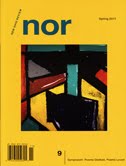 The New Ohio Review Symposium for Spring 2011 presents three poets’ discussions on someone’s “bad (weak or shallow or disappointing) poem” and someone’s “good poem.” With six poems “on the table” Wayne Miller, Helena Nelson, and David Rivard conversed via e-mail, and the results appear in this issue.
The New Ohio Review Symposium for Spring 2011 presents three poets’ discussions on someone’s “bad (weak or shallow or disappointing) poem” and someone’s “good poem.” With six poems “on the table” Wayne Miller, Helena Nelson, and David Rivard conversed via e-mail, and the results appear in this issue.
And the poems? Okay, here they are:
Wayne Miller presented “In America” by Susan Wood, and “The Nurse” by Dana Levin.
Helena Nelson presented “Rapture” by Carol Ann Duffy, and “Offering” by Michael Laskey.
David Rivard presented “The Idea by Mark Strand, and “Kindergarten” by Dennis Schmitz.
For good or bad – you’ll need to read it yourself.
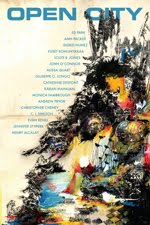 Open City Magazine has announced it will cease publication after a solid twenty-year run. The final issue of the magazine, Open City #30, was published in December 2010 and is still available in some stores as well as online.
Open City Magazine has announced it will cease publication after a solid twenty-year run. The final issue of the magazine, Open City #30, was published in December 2010 and is still available in some stores as well as online.
Former professor Morrison speaks on idea of reading: “Invisible ink is what lies under, between, outside the lines, hidden until the right reader discovers it,” Morrison said. “By right reader, I’m suggesting that certain books are not for every reader … Even a reader who loves the book may not be the best or right lover. The reader who has made the book is the one attuned to … discover the invisible ink.”
Like this link? We’ll be doing more like this on the NewPages Facebook Page – “Like” us to follow more cool stories and updates from NewPages.
You have to love a lit mag that lists “Kurt Vonnegut Writing Tips” in their submissions guidelines. From Foliate Oak – currently accepting submissions for artwork, prose and poems.
In his book Bagombo Snuff Box: Uncollected Short Fiction, Vonnegut listed eight rules for writing a short story:
Use the time of a total stranger in such a way that he or she will not feel the time was wasted.
Give the reader at least one character he or she can root for.
Every character should want something, even if it is only a glass of water.
Every sentence must do one of two things—reveal character or advance the action.
Start as close to the end as possible.
Be a Sadist. No matter how sweet and innocent your leading characters, make awful things happen to them—in order that the reader may see what they are made of.
Write to please just one person. If you open a window and make love to the world, so to speak, your story will get pneumonia.
Give your readers as much information as possible as soon as possible. To hell with suspense. Readers should have such complete understanding of what is going on, where and why, that they could finish the story themselves, should cockroaches eat the last few pages.
TED (Technology, Entertainment, Design) one of my favorite stops for GREAT informative, smart, video has recently launched TEDBooks, an imprint of short (less than 20,000 words) nonfiction works designed for digital distribution. Titles include Homo Evolutis by Juan Enriquez & Steve Gullans; The Happiness Manifesto by Nic Marks; and Beware Dangerism! by Gever Tulley
The Winter 2011 online issue of New Mirage Journal includes Georgia Ann Banks-Martin’s interview with Iranian poet Farideh Hassanzadeh-Mostafavi as well as a selection of the poet’s work.
The interview begins: “What inspires you to write?”
FH-M: “Violence. I mean my need to resist against violence. And violence has many manifestations such as fall, disloyalty, darkness, indifference, absence, ignorance, war, censorship, fetters, and many other things, sometimes as simple as a single white hair mid the black curls!”
New Mirage Journal is a quarterly journal publishing poetry from all over the world. “We are interested in high quality work that dares to speak of race, the human condition, the ‘struggle’ in fresh new ways.”
One of the more “cherished” childhood myths is the camp experience. Whether scout, day or sleep-away, kids are told camp is good for them. In other words, conformity is good. Yet the memory is polarizing. As with Star Wars vs. Star Trek or Super Mario over Donkey Kong, there is no in-between. Adults either loved or loathed every minute of it. And this former camper never saw one that looked like Matt Dillon did in Little Darlings. Continue reading “Eden Lake”
Qurratulain Hyder received India’s equivalent of the Pulitzer for Fireflies in the Mist, an epic, set mostly in Dacca, Bangladesh. The time period of its three parts, besides some earlier historical references, extends from 1939 to 1979, through India’s Partition and finally into partition from Pakistan to form an independent Bangladesh. As Aamer Hussein (who knew Hyder) said in the introduction, “history was an obsession with her; she saw time as a continuum.” Continue reading “Fireflies in the Mist”
The opening lines of Triggermoon Triggermoon establish immediately Cohen’s primary preoccupations. This is a poetry that concerns itself above all else with the relationship between self (as body, as moral agent in the world, as emotional intelligence, as individual in relationship to others) and the objects and physical constructs of daily life. The first poem, “There Was a Bridge of Tattered Rugs,” begins: Continue reading “Triggermoon Triggermoon”
I & We is Joseph P. Wood’s first full-length collection of poetry, having authored five chapbooks before. The poems in I & We are aggressive, violent at times, surprising, and unusual. The poem “In What I Have Done & What I Have Failed To Do,” which opens the book, concludes with the lines “I never thought God / would snap my spine,” after the speaker having described him or herself as “the photographer / snapping The Cross submerged in my urine.” Continue reading “I & We”
There are few writers today who can get away with the kind of book that Horizontal Surfaces is. However, when you are the prolific George Bowering, Canadian poet laureate of over 90 books, you might know a thing or two about a book that deserves publishing. Horizontal Surfaces is a curious little thing coming in at just under 100 pages, a collection of page-long essays that open more doors than they conclusively shut. Continue reading “Horizontal Surfaces”
If you don’t know much about the work of William Blake, Wilson will make you want to read him. If you know a lot about Blake, this book will make you want to read Wilson. He writes beautifully. He does an exceptionally fine job of summarizing Blake’s bio, elucidating Blake’s ideas on inspiration and the creative process, and he surprises his own readers by telling a personal story of struggles with the creative process, without actually focusing on himself or his personal story. The book is informative, inspiring, and intensely pleasurable. It’s also under, rather than over written, yet manages to be exuberant and full-bodied (in other words not deliberately cryptic). Continue reading “My Business Is to Create”
Farid Matuk's long book of poems from Letter Machine Editions is memorable and unique. Many of the poems deal with Matuk's status as an immigrant from Peru, and the life that accompanies it. But it is not done with any agenda. It's a beautiful, oddly paced look at this world which non-immigrants may not understand. One clear look at this is in a poem aptly titled “Immigrants”: Continue reading “This Isa Nice Neighborhood”
The etymology of the word jargon is unclear—historians of language aren’t sure of its derivation—which is ironic, considering what it means, and marvelously appropriate. In a pure sense, it simply connotes a specialized vocabulary related to a specific discipline or profession, though it’s common to hear the term used to refer, in a negative sense, to language that is considered impenetrable or deliberately opaque. I love the word and the idea of jargon as the title of a book of poems and prose poems. At the same time, I would say that Jargon is, happily, not impenetrable (as in incomprehensible), and while it reflects a unique and quirky personality and intelligence, it is not so much deliberately opaque, as deliberately and persistently original, and sometimes wonderfully confusing (a confusion I ended up not minding in the least). Continue reading “Jargon”
“Girl-ness” matters a lot to Kaschock. Her bio begins: “Kirsten Kaschock was the second, and then the third of five children.” And the book opens with a character who might be a girl or a woman or a woman/girl: “This is the house that Jane built. // Jane begins by standing. Once this was / Jane finding Jane.” Or Kirsten Kaschock finding Jane. Or finding Kaschock. And the relationship between girl-ness and the pain of that essential self matters a lot to Kaschock, too, and is the foundation (think house) for the book: Continue reading “A Beautiful Name for a Girl”
In her first full-length poetry collection, Our Chrome Arms of Gymnasium, Crystal Curry takes a daring and fresh stylistic approach. Chrome Arms displays less of a focus on the cryptic imagery that is popular today, filling that vacuum with a long-lost poetic art: fun. This book was a sheer pleasure to read. While images still exist in the poems, Curry places more emphasis on wordplay and syllables; bouncy and melodic, some of her lines just sound damn cool when read aloud, such as this excerpt from “Cherries”: Continue reading “Our Chrome Arms of Gymnasium”
Moschovakis explains in her acknowledgments that the (rare and odd) books that served as sources for many of the “major poems” in the collection were discovered and purchased at the Bibliobarn, “a miraculous used bookstore in South Kortright, NY.” As it happens, I have been in the most-assuredly-miraculous Bibliobarn in the Hudson Valley, and it would be difficult for any poet to leave this store without an armful of finds that will inform one’s writing for years. The book’s opening from its “[prologue]” makes the best argument for the wonder of the Bibliobarn’s inventory: “The problem is I don’t care whether I convince you or not / In a perfect world I would be able to convince you of this.” Continue reading “You and Three Others Are Approaching a Lake”
When Ben Franklin famously wrote “Nothing can be said to be certain except death and taxes,” he was not only ripping off Daniel Defoe, but he was also failing to anticipate Michael Klein’s second poetry book in 17 years, then, we were still living. Klein doesn’t actually have much to say about taxes, but he might take issue with “death” being “certain,” at least in the fatalistic way we tend to perceive it. Continue reading “then, we were still living”
Just one year after the publication of her first full-length book of poems (True Crime, Talisman House, 2009), Donna de la Perrière has presented us with another equally-stunning volume, precisely crafted and devastatingly haunting. Continue reading “Saint Erasure”
Nikky Finney’s Head Off & Split is a collection of 27 poems arranged in 3 sections titled, “The Hard • Headed,” “The Head • over • Heels,” and “The Head • Waters.” The first and last poems stand outside these sections and bookend the collection on a thematic level. The theme of this stunning collection of poems is emotional evisceration which is symbolized by the central image suggested by the title: a beheaded and gutted fish. Continue reading “Head Off & Split”
A dense collection, Asunder is half short stories, most of them very short, and half a novella-in-shorts. In the first section of unconnected shorts, Robert Lopez moves through scenes and characters that are mostly blank, anonymous—they could be anywhere and anyone. For this reason, the stories have a haunting quality, a creepy sort of universality. Continue reading “Asunder”
Glimmer Train has just chosen the winning stories for their December Fiction Open competition. This competition is held quarterly and is open to all writers for stories with a word count range between 2000 – 20,000. The next Fiction Open will take place in March.
Glimmer Train’s monthly submission calendar may be viewed here.
 First place: Stefanie Freele, of Geyserville, CA, wins $2000 for “While Surrounded by Water.” Her story will be published in the Spring 2012 issue of Glimmer Train Stories.
First place: Stefanie Freele, of Geyserville, CA, wins $2000 for “While Surrounded by Water.” Her story will be published in the Spring 2012 issue of Glimmer Train Stories.
Second place: Dana Kroos, of Las Cruces, NM, wins $1000 for “Sleepwalkers.” Her story will also be published in an upcoming issue of Glimmer Train Stories.
Third place: Joseph Johns, of Decatur, GA, wins $600 for “Reckoning Day with High Cirrus.”
A PDF of the Top 25 winners can be found here.
Short Story Award for New Writers: Deadline February 28
This competition is held quarterly and is open to all writers whose fiction has not appeared in a print publication with a circulation over 5000. No theme restrictions. Most submissions to this category run 3000-6000 words, but can go up to 12,000. Click here for complete guidelines.
Compiled in association with the University of Glasgow’s Department of Literary Studies and the Association of Scottish Literary Studies, VisitScotland.com offers a new guide details 60 places to visit in Scotland associated with writers and their works: writers’ homes, birthplaces, graves, locations vividly described in novels and poems, theatres, writers’ museums and more. The guide can be downloaded from the website and includes full color pictures throughout. Be patient: with 60 pages full-color, it takes several minutes to download.
 Under the guidance of Shanna Miller McNair, Publisher, Founder & Editor-in-Chief, The New Guard is the first “independent multi-genre literary review in the state of Maine” whose aim is to “juxtapose narrative with experiment and create a new dialogue.” TNG is a print annual, available for purchase directly from the publication.
Under the guidance of Shanna Miller McNair, Publisher, Founder & Editor-in-Chief, The New Guard is the first “independent multi-genre literary review in the state of Maine” whose aim is to “juxtapose narrative with experiment and create a new dialogue.” TNG is a print annual, available for purchase directly from the publication.
The New Guard held two contests for their premier issue: William Derge won the contest in fiction judged by Debra Spark, and Payne Ratner won the contest in poetry judged by Donald Hall. Each contest offered a $1,000 prize and publication in this issue along with all the finalists.
This inaugural issue features new essays by Jaed Coffin & Bill Roorbach, and a segment called “Writers to Writers: Fan Letters to the Dead,” a collection written especially for TNG. Contributors to the fan letter segment include Sven Birkerts, Adam Braver, Boman Desai, Annie Finch, John Goldbach, Tom Grimes, Richard Hoffman, Maxine Kumin, Thomas Lynch, Josip Novakovich, Lewis Robinson, Afaa Michael Weaver & Scott Wolven.
The New Guard seeks to publish literary and experimental fiction, narrative and experimental poetry. Submissions for the next issue will begin Spring-Summer 2011.
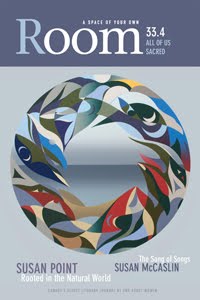 Room: Canada’s Oldest Literary Magazine By and About Women issue 33.4 is a themed issue on women and spirituality. Room’s website offers samples of full-cover art, poetry from Michelle Barker, and fiction from Holley Rubinski. Pictured: “The Edge” cover art by Susan Point.
Room: Canada’s Oldest Literary Magazine By and About Women issue 33.4 is a themed issue on women and spirituality. Room’s website offers samples of full-cover art, poetry from Michelle Barker, and fiction from Holley Rubinski. Pictured: “The Edge” cover art by Susan Point.
Always a popular topic, The Aurorean editor Cynthia Brackett-Vincent tells writers in her blog post An Editor’s Wish List.
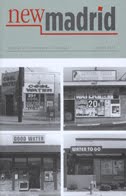 Editor Ann Neelon writes in her introduction to The New Madrid that the Winter 2011 issue “commemorates the declaration by the General Assembly of the United Nations in July 2010 that access to safe and clean drinking water and sanitation is a basic human right. It also solemnizes the terrifying fury of the floods that have ravaged the planet this year in Kentucky and Tennessee, as well as in Pakistan, Poland, Portugal, Brazil, China, France, Romania, Ukraine, Hungary, Peru, Mexico, Canada, Columbia, Australia, Indonesia, Serbia, Argentina, Kenya, Nigeria, Spain, Guatemala, and Singapore. We’ve all gotten used to images of streets turned into rivers, people with no belongings any more being transported in boats instead of cars. Water, water everywhere, but not a drop for anguished refugees to drink.”
Editor Ann Neelon writes in her introduction to The New Madrid that the Winter 2011 issue “commemorates the declaration by the General Assembly of the United Nations in July 2010 that access to safe and clean drinking water and sanitation is a basic human right. It also solemnizes the terrifying fury of the floods that have ravaged the planet this year in Kentucky and Tennessee, as well as in Pakistan, Poland, Portugal, Brazil, China, France, Romania, Ukraine, Hungary, Peru, Mexico, Canada, Columbia, Australia, Indonesia, Serbia, Argentina, Kenya, Nigeria, Spain, Guatemala, and Singapore. We’ve all gotten used to images of streets turned into rivers, people with no belongings any more being transported in boats instead of cars. Water, water everywhere, but not a drop for anguished refugees to drink.”
Contributers to this issue include Mario Chard, Teresa Milbrodt, Ruth Goring, Jennifer Atkinson, Scott Gould, Karen Holmberg, Matthew Nienow, Jeff Fearnside, Kristian Ansand Walter, Anthony Opal, Nikki Zielinski, Peter F. Murphy, Randall Horton, Ellen Ann Fentress, Deborah Bauer, and Sant Khalsa (photographer/cover art).
Michelle Chan Brown’s poetry collection Double Agent was selected out of over 300 as the winner of this year’s Kore Press First Book Award.
Runner-Ups
Music for Birds by Ali Lanzetta
three stamens*seventeen syllables by Tamiko Beyer
Nesting Papers by Christine Choi
Anti-Portrait at Flashpoint by Cori A. Winrock
TheStar.com reporter Adrian Brijbassi takes a walk in the Haymarket area of St. Petersburg in the footsteps of Fyodor Dostoevsky’s anti-hero, Raskolnikov (2:39 minutes).
The Inaugural Issue of The Written Wardrobe Includes Fiction, Creative Nonfiction, and Poetry
“ModCloth, an online boutique specializing in women’s apparel, accessories, and decor, has ventured into uncharted territories for a retailer—they’ve launched an online fashion-focused literary anthology, The Written Wardrobe: Where Style and Story Collide. The Written Wardrobe features style and fashion writing in the form of poetry, fiction, and creative nonfiction. It celebrates a diverse range of aesthetics, from an experimental poem to an illustrated children’s book, which appear alongside more traditional short stories, essays, and poems.”
The Written Wardrobe is accepting poetry, fiction, and nonfiction that “explores the way in which fashion influences and affects our lives.” Deadline: August 1, 2011.